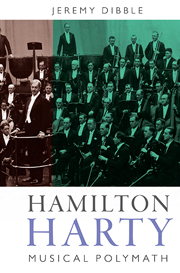Book contents
- Frontmatter
- Dedication
- Contents
- List of Illustrations
- List of Music Examples
- Preface
- Abbreviations
- Epigraph
- 1 1879–1901 Hillsborough, Belfast and Dublin: A Musical Apprenticeship
- 2 1901–9 London (1): A Pre-eminent ‘Collaborator’ and Aspiring Composer
- 3 1909–14 London (2): Composer and Conductor
- 4 1914–20 The War Years and After
- 5 1920–27 The Hallé Years
- 6 1927–33 Apogee: From Hallé to the LSO
- 7 1933–6 America and Australia: An Unforeseen Romance
- 8 1936–41 The Last Years: The Children of Lir – A Creative Codicil
- APPENDIX 1 List of Works
- APPENDIX 2 List of Recordings
- Bibliography
- Index of Harty's Works
- General Index
- Music in Britain, 1600–2000
6 - 1927–33 Apogee: From Hallé to the LSO
Published online by Cambridge University Press: 05 December 2013
- Frontmatter
- Dedication
- Contents
- List of Illustrations
- List of Music Examples
- Preface
- Abbreviations
- Epigraph
- 1 1879–1901 Hillsborough, Belfast and Dublin: A Musical Apprenticeship
- 2 1901–9 London (1): A Pre-eminent ‘Collaborator’ and Aspiring Composer
- 3 1909–14 London (2): Composer and Conductor
- 4 1914–20 The War Years and After
- 5 1920–27 The Hallé Years
- 6 1927–33 Apogee: From Hallé to the LSO
- 7 1933–6 America and Australia: An Unforeseen Romance
- 8 1936–41 The Last Years: The Children of Lir – A Creative Codicil
- APPENDIX 1 List of Works
- APPENDIX 2 List of Recordings
- Bibliography
- Index of Harty's Works
- General Index
- Music in Britain, 1600–2000
Summary
In May 1927 Manchester mourned the passing of Langford, who had followed the progress of the Hallé since the days of Richter. Harty was reputed to have stayed away from the funeral. ‘Why should I go to the funeral of that – market gardener?’, was his anecdotal reply (making reference to Langford's predilection, like that of his father, for horticulture). Langford's place was taken by Neville Cardus, who was already well known to readers of the Manchester Guardian for his imaginative prose and his columns on cricket and the theatre. His admiration for Langford's work was considerable, and as a tribute to his former colleague he edited a selection of his reviews for publication in 1929. Cardus, untrained in music, but whose emotional, untechnical responses appealed to his audience, had already reviewed a number of Harty's opera productions for the Manchester Guardian, so he was familiar with Harty's style of programming. After the concert series for 1927–8 had been announced, Cardus weighed in with pointed criticism:
unless the arrangements for the season now announced do not reveal everything, next March will find most of us as wise as we are to-day about Stravinsky's ‘Le Sacre du Printemps’, about the Five Orchestral Pieces of Schönberg, about Holst's ‘Hymn of Jesus’, Vaughan Williams's ‘Pastoral’ Symphony, Delius's ‘A Mass of Life’, Arnold Bax, Béla Bartók and Honegger. … In Manchester it is sometimes hard to hear all the crackling of the flames under the melting-pot, as it boils prodigiously from hour to hour.
- Type
- Chapter
- Information
- Hamilton HartyMusical Polymath, pp. 188 - 222Publisher: Boydell & BrewerPrint publication year: 2013



